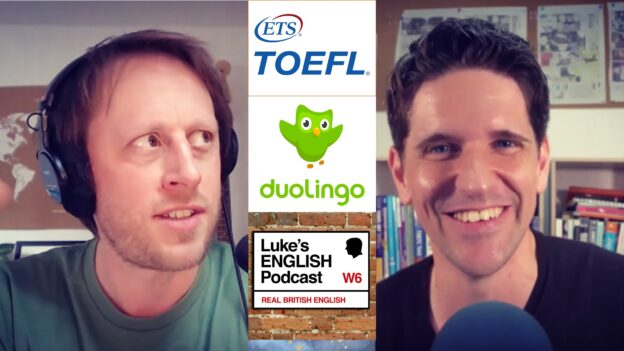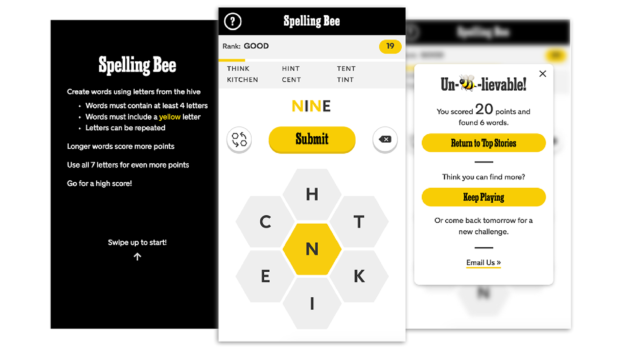Fred Eyangoh returns to the podcast to bring some entertaining and useful word puzzles, quizzes and insights into English etymology & history.
Audio Version (Including 30min+ extra vocabulary summary and intro)
Video Version (just the conversation with Fred)
Intro Transcript & Vocabulary Notes
Hello dear listeners,
Welcome back to the podcast. I hope you are doing well. Here are just a few words before we get stuck into this episode properly.
I am currently sitting here in my pod room. I got back from my holiday last week. Here we are. Back to normal life, whatever that means these days.
It was a very nice holiday, thanks for asking. I might do a post-holiday ramble episode and talk about it a little bit – although actually there isn’t that much to tell. Just standard holiday things – sunshine, a bit of time at the beach, a bit of swimming pool, a bit of cycling, eating seafood, plenty of relaxing, reading, playing with my daughter, spending time with the family – no big adventures really, no encounters with bears or volcano climbing this time.
Anyway I might do the traditional post-holiday ramble over the next week or so, we will see.
The thing is, I actually have a bit of a backlog of episodes to publish. I recorded 3 things during the holiday. So I just want to crack on get them published really, so I might forgo the post-holiday ramble this time. We will see. In any case, freshly recorded episodes are coming, including premium content where we get into the language side of things.
It’s nice to be back in podcastland, if a little strange. You know when you’ve been away on holiday, there’s a slightly odd feeling of melancholy when you return. That September feeling. That’s how it is for me – a kind of end-of-the-holidays, Sunday evening, going back to school sort of slightly sad feeling that I always used to get as a child and I still get these days as an adult. Maybe it’s a northern hemisphere thing, at this time of year.
As September arrives there’s that little hint in the air that autumn is here and winter is just around the corner. The kids all go back to school and we start thinking about work and studies again, and the things we’re trying to achieve, maybe learning English in your case, and after all, that is why we are here.
That’s why I am here right now, talking to you on this podcast – to help you improve your English and to enjoy the whole process, which is so important. Learning English can be enjoyable and should be enjoyable because it’s probably more effective if it is enjoyable. So there. I invite you to enjoy listening to my podcast and to let the magic happen.
Now, I need to introduce this episode and I am going to do my best to keep this little introduction as brief as possible. You’ll see that the episode is long. There’s plenty of good stuff here, from beginning to end. I hope you listen to the whole thing, in several stages if you prefer.
All I want to say is that this episode is packed with English language learning potential.
There is a veritable Smörgåsbord of vocabulary here for you to notice and pick up, a few more differences between American and British English and also some general inspiration for your learning of English.
The overall message being – there are many ways to get new vocabulary into your life, but the main thing is that you need to maintain a certain level of curiosity, an open minded willingness to challenge yourself a bit, a certain readiness to be entertained while you listen and study and a focused yet relaxed approach to the acquisition of English through all manner of different avenues.
My guest, Fred, technically doesn’t have English as a first language but he has a really broad range of English vocabulary in his head. He likes to do word games and he reads a lot, and checks new words in various online dictionaries, and explores those words and phrases until they become memorable for him, and he notices them again and again, and he tests himself with word games, and learns new things from the questions he can’t answer, and has fun doing it all. I think it’s a really good attitude. Let’s explore that and do some word games.
This conversation is actually a continuation of the theme of a couple of episodes I did with Fred last year in which we looked at the New York Times Spelling Bee, and also some word quizzes on the Collins Dictionary website (episodes 720 and 721).
This time Fred came back on the podcast to talk about crossword puzzles in which you have to use clues to find missing words in a grid. Sometimes the clues are quite cryptic and contain clever little riddles which you have to work out. Fred presents a few of these crossword puzzles to me during the episode and I invite you to listen carefully to the clues and try to guess the words with me. There are about 25 different questions overall, but plenty of other words and phrases which come up along the way.
We also talk about the history of English and the etymology of English words which have their origins in other languages and which reveal things about England’s ancient history and colonial past.
So there’s lots of word quizzes and vocab games, and then at the end a bit about etymology, English history and colonialism.
If you find it hard to keep track of all the vocab during this chat, then don’t worry because I’ll give a quick summary of it all at the end of the episode, and I mean quick. Just to consolidate some of the things you heard I will list the vocabulary at the end. It won’t be the full LEP Premium treatment. It’ll just be a quick a reminder, to recap.
Check the episode page on my website for all the vocabulary notes. There’s a video version too which you might want to check out on YouTube, but it doesn’t contain this lovely introduction or the incredibly useful and generous vocab re-cap which I will do at the end of this wonderful audio version.
Now, without any further ado, let’s chat to Fred again, and here we go…
Ending
So there you are that was Fred Eyangoh, being very useful there and sharing lots of fun vocab quiz questions and also insights about how crossword puzzles work and also words which have their roots in other languages.
I’ll invite Fred back onto this podcast to play “Plant, dish or animal”, which sounds like a fun game.
My prediction for the episode length
I said 1h36min
For the video version I was very close. It’s 1h34min22sec.
This audio version though is clearly much longer.
Vocabulary Summary
Mini Crossword Clues and Answers
- Helpful reference for tourists – MAP
- Dressy short sleeved shirt – POLO (Dressy means smart)
- They have meters and motors – TAXIS (A meter is what counts the distance and price of the taxi journey)
- D on a gearshift – DRIVE (In US English a “gearshift” is thing you use to change gears in a car – either an automatic or manual car, in UK English it’s more likely to be called a gear stick)
- Fighting spirit – MOXIE (Moxie means “courage” or “nerve”, “guts” in US and Canadian slang)
- Look _____ out there – LOOK ALIVE OUT THERE! (This is something that people shout at baseball players to encourage them. People also say “Attaboy” – “At her boy!”)
- Football scores, for short – TDS (this is an abbreviation for “touchdowns”, which is of course American English because touchdowns are part of what we call American Football or Gridiron Football, but in the USA they just call it football, and they’re wrong of course, it’s not football it’s hand egg – just joking, they can call it football if they want, because, they have guns)
- ____-ball – SKEE (Skee ball is a game that you might find in amusement arcades in the USA. To me it’s the kind of word that you hear sometimes in American movies or TV shows)
Fred’s Crossword Quiz Questions for Luke
- Campaigned for office – RAN (to run for president, for example)
- Urban air pollution – SMOG (A portmanteau word between smoke and fog)
- Rowing tool – OAR (also “to stick your oar in” – meaning to get involved in a situation which you shouldn’t be involved in. E.g. when two people are arguing and you interrupt and give your opinion too, but it just makes the argument worse, “Sticking your oar in doesn’t help! Just mind your own business)
- Kisses and caresses in British lingo – SNOGS
- It may pop before a toast – CORK
- Doe’s mate (the mate of a doe) – STAG
Other related words:
buck (also a male deer) to buck (when a horse kicks its legs to get someone off its back)
to buck the trend (to do something different than the trend – e.g. to focus on long form audio content, rather than short form video content)
a fawn (a young deer – pronounced /fɔ:n/ by me and /fɑ:n/ by Fred with his American accent. - Angers – IRES (to ire someone means to make someone angry or frustrated, but I never use this word. Still it’s useful to know it and it’s the kind of thing that might come up in a book or something – also useful for crosswords and scrabble)
- Fuss, kerfuffle, trouble, tizzy, hubbub, brouhaha, ballyhoo – ADO
- Blocked, as a river – DAMMED (We also have “Damned” as a kind of swear word, which for me sounds the same as dammed)
- “Hold your horses” – WAIT
- Shush – ZIP IT!
- Current events? – TIDES (current has several meanings – a current in the water, an electrical current, and also the adjective current which means at the moment *not actual* as in some languages. Also there’s the homophone word currant which is a small dried grape, like a raisin)
- Drop a line? – FISH (“drop me a line” means “call me on the phone” but you also drop a line when you go fishing)
- Mini freezer – BRAKE (the brake is what stops a car, and a Mini is a kind of car. To freeze means to stop, so a mini freezer is a brake)
- Good or bad vacuum review – SUCKS (this vacuum sucks! Good, that’s what it’s supposed to do!)
- Locale for drawers in the study – ART SCHOOL (tricky – but it’s where you find artists involved in studying)
Draw a picture with a pencil
A drawer where you keep your knives and forks
He speaks with a southern drawl









